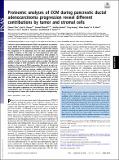Proteomic analyses of ECM during pancreatic ductal adenocarcinoma progression reveal different contributions by tumor and stromal cells
Author(s)
Tian, Chenxi; Clauser, Karl R.; Öhlund, Daniel; Rickelt, Steffen; Huang, Ying; Gupta, Mala; Mani, D. R.; Carr, Steven A.; Tuveson, David A.; Hynes, Richard O; ... Show more Show less
DownloadPublished version (1.496Mb)
Terms of use
Metadata
Show full item recordAbstract
Pancreatic ductal adenocarcinoma (PDAC) has prominent extracellular matrix (ECM) that compromises treatments yet cannot be nonselectively disrupted without adverse consequences. ECM of PDAC, despite the recognition of its importance, has not been comprehensively studied in patients. In this study, we used quantitative mass spectrometry (MS)-based proteomics to characterize ECM proteins in normal pancreas and pancreatic intraepithelial neoplasia (PanIN)- and PDAC-bearing pancreas from both human patients and mouse genetic models, as well as chronic pancreatitis patient samples. We describe detailed changes in both abundance and complexity of matrisome proteins in the course of PDAC progression. We reveal an early upregulated group of matrisome proteins in PanIN, which are further upregulated in PDAC, and we uncover notable similarities in matrix changes between pancreatitis and PDAC. We further assigned cellular origins to matrisome proteins by performing MS on multiple lines of human-to-mouse xenograft tumors. We found that, although stromal cells produce over 90% of the ECM mass, elevated levels of ECM proteins derived from the tumor cells, but not those produced exclusively by stromal cells, tend to correlate with poor patient survival. Furthermore, distinct pathwayswere implicated in regulating expression of matrisome proteins in cancer cells and stromal cells. We suggest that, rather than global suppression of ECM production, more precise ECM manipulations, such as targeting tumor-promoting ECM proteins and their regulators in cancer cells, could be more effective therapeutically.
Date issued
2019-09Department
Koch Institute for Integrative Cancer Research at MITJournal
Proceedings of the National Academy of Sciences
Publisher
Proceedings of the National Academy of Sciences
Citation
Tian, Chenxi et al. "Proteomic analyses of ECM during pancreatic ductal adenocarcinoma progression reveal different contributions by tumor and stromal cells." Proceedings of the National Academy of Sciences 115, 39 (September 2019): 19609-19618 © 2019 National Academy of Sciences
Version: Final published version
ISSN
0027-8424
1091-6490